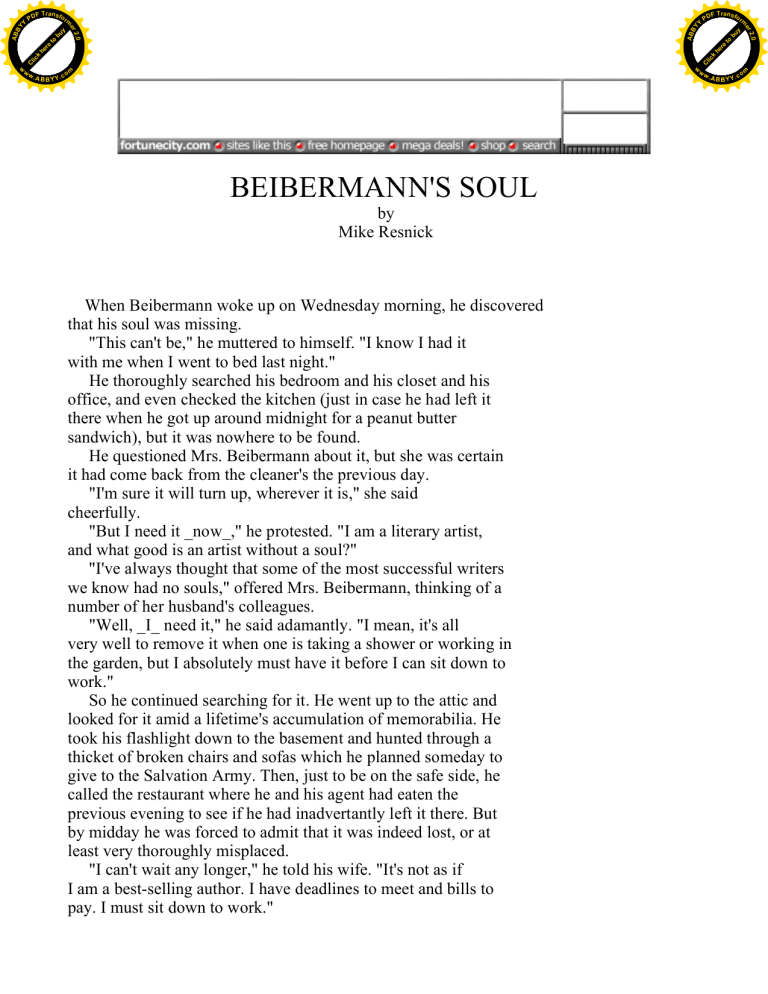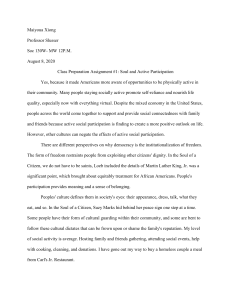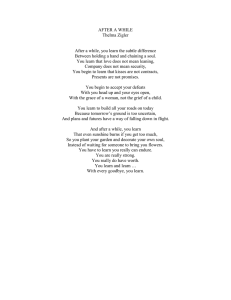Learn German By Reading Fantasy (Lernen Sie Deutsch mit Fantasy Romanen 1) (German Edition) -- Mozaika Educational -- 2014 -- Mozaika Educational -- 8f3736bba96f8b073d1b71d36a7ea9df -- Anna’s Archive
advertisement

Y F T ra n sf o A B B Y Y.c bu to re he C lic k he k lic C w. om w w w w rm y ABB PD re to Y 2.0 2.0 bu y rm er Y F T ra n sf o ABB PD er Y BEIBERMANN'S SOUL by Mike Resnick When Beibermann woke up on Wednesday morning, he discovered that his soul was missing. "This can't be," he muttered to himself. "I know I had it with me when I went to bed last night." He thoroughly searched his bedroom and his closet and his office, and even checked the kitchen (just in case he had left it there when he got up around midnight for a peanut butter sandwich), but it was nowhere to be found. He questioned Mrs. Beibermann about it, but she was certain it had come back from the cleaner's the previous day. "I'm sure it will turn up, wherever it is," she said cheerfully. "But I need it _now_," he protested. "I am a literary artist, and what good is an artist without a soul?" "I've always thought that some of the most successful writers we know had no souls," offered Mrs. Beibermann, thinking of a number of her husband's colleagues. "Well, _I_ need it," he said adamantly. "I mean, it's all very well to remove it when one is taking a shower or working in the garden, but I absolutely must have it before I can sit down to work." So he continued searching for it. He went up to the attic and looked for it amid a lifetime's accumulation of memorabilia. He took his flashlight down to the basement and hunted through a thicket of broken chairs and sofas which he planned someday to give to the Salvation Army. Then, just to be on the safe side, he called the restaurant where he and his agent had eaten the previous evening to see if he had inadvertantly left it there. But by midday he was forced to admit that it was indeed lost, or at least very thoroughly misplaced. "I can't wait any longer," he told his wife. "It's not as if I am a best-selling author. I have deadlines to meet and bills to pay. I must sit down to work." w. A B B Y Y.c om Y F T ra n sf o A B B Y Y.c bu to re he C lic k he k lic C w. om "Shall I place a notice in the classified section of the paper?" she asked. "We could offer a reward." "Yes," he said. "And report it to the police as well. They must stumble across lost and mislaid souls all the time." He walked to his office door, turned to his wife, and sighed dramatically. "In the meantime, I suppose I'll have to try to make do without it." So he closed the office door, sat down, and began to work. Ideas (though not entirely his own) flowed freely, concepts (slightly tarnished but still workable) easily manifested themselves, characters (neatly labeled and ready to perform) popped up as he needed them. In fact, the ease with which he achieved his day's quota of neatly-typed pages surprised him, although he had the distinct feeling that there was something _missing_, some element that could only be supplied by his misplaced soul. Still, he decided, staring at what he had thus far accomplished, a lifetime's mastery of technique could hide a lot of faults. So he did a little of this, and a little of that, made a correction here, inserted some literary pyrotechnics there. He imbued it with a certain fashionable eroticism to impress his audience and a certain trendy obtuseness to bedazzle the critics, and finally he emerged and showed the finished product to his wife. "I don't like it," said Mrs. Beibermann. "I thought it was rather good," said Beibermann petulantly. "It _is_ rather good," she agreed. "But you never settled for rather good before." Beibermann shrugged. "It's got a lot of style to it," he said. "Maybe no one else will see what's missing." And indeed, no one else _did_ see what was missing. His agent loved it, his public loved it, and most of all, his editor loved it. He deposited an enormous check in his bank account and went back to work. "But what about your soul?" asked his wife. "Oh, make sure the police are still looking for it, by all means," replied Beibermann. "But in the meantime, we must eat -and technique is not, after all, to be despised." His next three projects brought higher advances and still more critical acclaim. By now he had also created a public _persona_ -- articulate, worldly, with just a hint of the sadness of one who had suffered too much for his Art -- and while he still missed his soul, he had to admit that his new situation in the world was not at all unpleasant. "We have enough money now," announced his wife one day. "Why w w w w rm y ABB PD re to Y 2.0 2.0 bu y rm er Y F T ra n sf o ABB PD er Y w. A B B Y Y.c om Y F T ra n sf o A B B Y Y.c bu to re he C lic k he k lic C w. om don't we take a vacation? Surely your soul will be found by then -- and even if it isn't, perhaps we can get you a new one. I understand they can make one up in three days in Hong Kong." "Don't be silly," he said irritably. "My work is more popular than ever, I'm finally making good money, this is hardly the time for a vacation, and weren't you a lot thinner when I married you?" He began sporting a goatee and a hairpiece after his next sale, and started working out in the neighborhood gymnasium, so that he wouldn't feel awkward and embarrassed when sweet young things accosted him for autographs at literary luncheons. He borrowed a number of sure-fire jokes and snappy comebacks and made the circuit of the television talk shows, and even began work on his autobiography, changing only those facts that seemed dull or mundane. And then, on a cold winter's morning, a police detective knocked at his front door. "Yes?" said Beibermann, puffing a Turkish cigarette through a golden holder, and eyeing him suspiciously. The detective pulled out a worn, tattered soul and held it up. "This just turned up in a pawn shop in Jersey," said the detective. "We have every reason to believe that it might be yours." "Let me just step into the bathroom and try it on," said Beibermann, taking it from him. Beibermann walked to the bathroom and locked the door behind him. Then he carefully unfolded the soul, smoothing it out here and there, and trying not to wince at its sorry condition. He did not try it on, however -- it was quite dirty and shopworn, and there was no way to know who had been wearing it. Instead he began examining it thoroughly, looking for telltale signs -- a crease here, a worn spot there, most of them left over from his college days -- and came to the inescapable conclusion that he was, indeed, holding his own soul. For a moment his elation knew no bounds. Now, at last, he could go back to producing works of true Art. Then he stared at himself in the mirror. He'd have to go back to living on a budget again, and of course there'd be no more spare time, for he was a meticulous craftsman when he toiled in the service of his art. Beibermann frowned. The innocent young things would seek someone else's autograph, the television hosts would flock to a new bestseller, and the only literary luncheons he would attend would be for some _other_ author. He continued staring at the New Improved Beibermann, admiring the well-trimmed goatee, the satin ascot, the tweed smoking w w w w rm y ABB PD re to Y 2.0 2.0 bu y rm er Y F T ra n sf o ABB PD er Y w. A B B Y Y.c om Y F T ra n sf o A B B Y Y.c bu to re he C lic k he k lic C w. om jacket, the world-weary gaze from beneath half-lowered eyelids. Then, sighing deeply, he unlocked the door and walked back to the foyer. "I'm sorry," he said as he handed the neatly-folded soul back to the detective, "but this isn't mine." "I apologize for taking up the valuable time of a worldfamous man life yourself, sir," said the detective. "I could have sworn this was it." Beibermann shook his head. "I'm afraid not." "Well, we'll keep plugging away, sir." "By all means, officer," said Beibermann. He lowered his voice confidentially. "I trust that you'll be _very_ discreet, though; it wouldn't do for certain critics to discover that my soul was missing." He passed a fifty-dollar bill to the detective. "I quite understand, sir," said the detective, grabbing the bill and stuffing it into a pocket of his trenchcoat. "You can depend on me." Beibermann smiled a winning smile. "I knew I could, officer." Then he returned to his office and went back to work. *** He had been dead and buried for seven years before anyone suggested that his work lacked some intangible factor. A few revisionist critics agreed, but nobody could pinpoint what was missing. Mrs. Beibermann could have told them, of course -- but she had taken an around-the-world cruise when Beibermann left her for the second of his seven wives, met and married a banker who was far too busy to discuss Art, and spent the rest of her life raising orchids, avoiding writers, and redecorating her house. -- The End -- w w w w rm y ABB PD re to Y 2.0 2.0 bu y rm er Y F T ra n sf o ABB PD er Y w. A B B Y Y.c om




